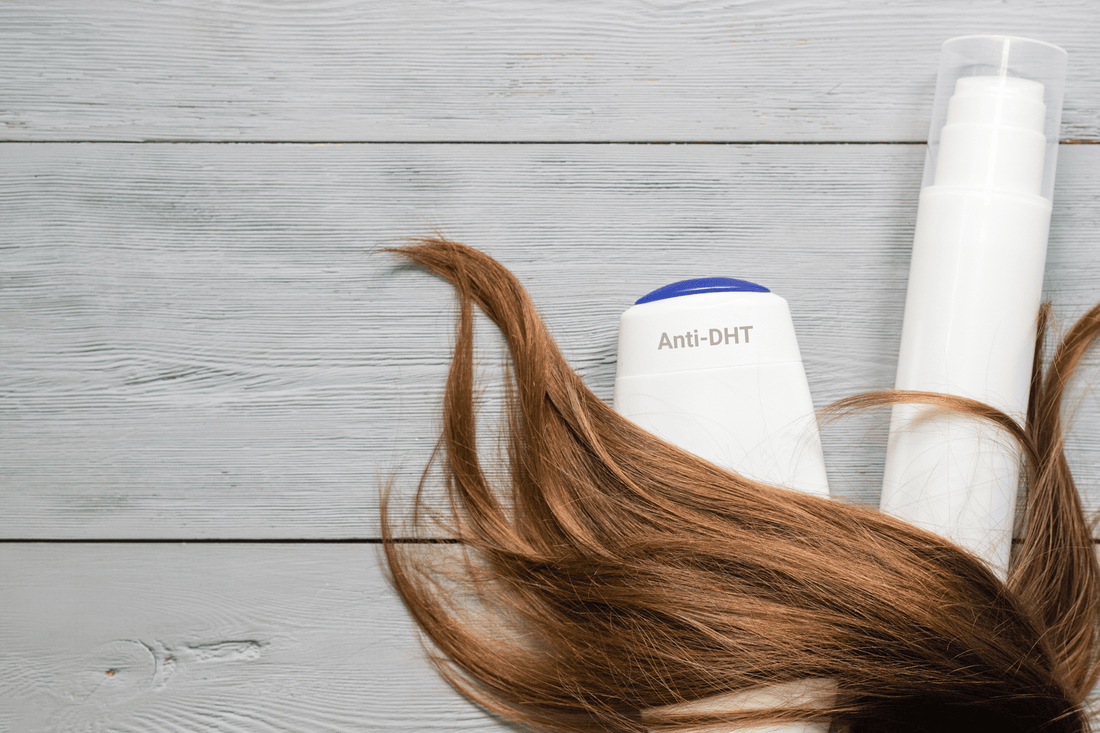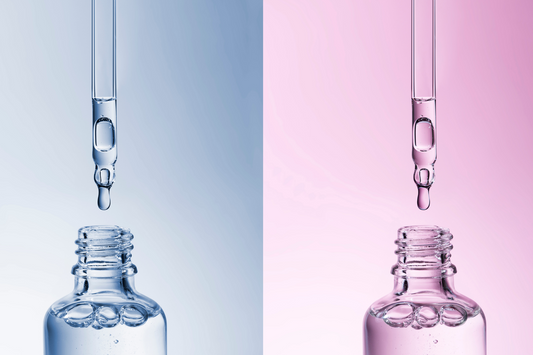If you’re dealing with hair loss or thinning, you’ve probably come across DHT blocking shampoos at one point or another. The internet is littered with lists for the best DHT shampoos and ads for anti-DHT shampoos. But the real question is, do they really work?
Looking for a shorter summary? Check out the video below.
What is DHT and how does it affect Hair Loss?
Before we go into DHT blocking shampoos, let’s quickly review the role of DHT in the hair cycle and in hair loss. If you want more details on the hair cycle and how testosterone, specifically DHT, affects it, check out our other blog posts!
Testosterone and DHT’s role in the Hair Cycle
Testosterone is a steroid hormone. It is a major sex hormone in men, but women also produce testosterone regularly - just in smaller amounts. Hormones are extremely important because they serve as chemical messengers in the body. They travel through the bloodstream and give directions to our cells and organs on how to develop and work properly. Testosterone and DHT are types of hormones known as androgens and thus, their message-receiving counterparts are known as androgenic receptors.
Our hair follicles contain many of these receptors and as the body goes through puberty, androgens direct the follicles to produce thicker, coarser hair. However, as we continue to age, the accumulation of these androgens can have the opposite effect! They can make the hair follicle shrink causing the follicles that once produced healthy, thick hair go back to producing thinner hair. Sometimes they can be damaged to a point where they no longer produce hair at all.
How is DHT different from Testosterone?
DHT is short for dihydrotestosterone. Since “testosterone” is in the name, you’ve probably already guessed that it’s extremely similar to testosterone. Actually, DHT is produced from testosterone. When testosterone interacts with an enzyme known as 5ɑ-reductase, it transforms into DHT.
You may be wondering why this is important. Remember those androgenetic receptors? They can bind to DHT much better than testosterone meaning in the hair follicle they receive a more frequent and stronger message to shrink follicles. On top of that, the scalp contains one of the highest levels of 5ɑ-reductase in the body, so a lot of testosterone converts to DHT around your hair follicles!
The Rundown on DHT Blocking Shampoos
Now that we’ve covered DHT biologically, let’s get back to DHT blocking shampoos. DHT blocking shampoos or anti-DHT shampoos are precisely what they sound like: shampoos formulated with ingredients that block DHT. In the world of hair loss treatments, particularly for men, blocking DHT is not a new concept. For example, finasteride, an FDA approved oral medication, works by blocking 5ɑ-reductase therefore reducing the amount of DHT. Anti-DHT shampoos are, in theory, supposed to work in a similar way but topically. While this seems like a great solution on the (sudsy) surface, with new DHT blocking shampoos popping up in every corner of the internet each day, a healthy dose of skepticism is warranted.
The Best DHT Blocking Shampoo Ingredients
When it comes to hair loss products, the active ingredient or ingredients are what makes that product effective. For example, ProCelinyl™ in Revela’s Hair Serum is the active ingredient that allows our product to work. Most hair care products, especially DHT blocking shampoos, have a couple active ingredients that play a role in helping hair loss and thinning, while the other ingredients are for texture, scent, and overall feel of the product. So what are these active ingredients in DHT shampoos?
Ketoconazole
Ketoconazole is an antifungal normally used to treat skin conditions like athlete's foot, jock itch, and ringworm. In topical formulations (like DHT shampoos) it can be helpful for certain kinds of dandruff as well. A study conducted in 1998 showed that 2% ketoconazole formulated as a DHT blocking shampoo improved hair density and the size and proportion of hair follicles in the anagen phase. However, it’s important to note that other studies on ketoconazole as an anti-DHT shampoo ingredient are extremely limited, and there are no large scale studies to validate the claims of the original paper.
Saw Palmetto
Saw palmetto is a natural ingredient extracted from the berries of the Serenoa repens plant found in southeastern United States. Purified saw palmetto extract is mostly made up of fatty acids and sterols particularly carotenoids, lipases, tannin, sugars, and fatty acids like palmitic acid, oleic acid, and beta sitosterol. Though there is not much research done on the mechanism of action of saw palmetto extract, particularly as an ingredient in DHT blocking shampoos, it’s said to behave similarly to finasteride and block 5ɑ-reductase. A 2-year study showed that patients treated with saw palmetto, though not administered via DHT shampoo, saw an improvement in hair density.
Pumpkin Seed Oil
Pumpkin seed oil is another naturally derived ingredient that could have a positive effect on hair growth when formulated into an anti-DHT shampoo. A study conducted on men with benign prostatic hyperplasia - another condition affected by DHT - showed that pumpkin seed oil improved their conditions leading scientists to hypothesize that it could block DHT. A different study showed that pumpkin oil increased hair growth in men with androgenetic alopecia.
Rosemary Oil
As it’s recently been trending on social media as a hair growth solution, rosemary oil is another popular DHT shampoo ingredient. We’ve gone into more detail about this in a previous post, but in short, researchers identified the DHT blocking component in rosemary oil as 12-methoxycarnosic acid (12-MCA).
So do these Anti-DHT Shampoos really Work?
We’ve gone over DHT in the context of hair biology and the active ingredients found in DHT shampoos, but the question still remains: Do anti-DHT shampoos really work? The answer is unfortunately not a strict “yes” or “no.” An unsatisfying “maybe” is not the ideal answer, but that is the reality of many hair loss products.
Though the active ingredients in many DHT blocking shampoos have promising results, anti-DHT shampoos are certainly not the cure-all for hair loss, especially as a standalone product. The problem is in the application and use of a shampoo. Shampoo is a wash-off product. Which means it only remains on the scalp for a couple minutes at most before being rinsed off. That is not nearly enough time for the active ingredient(s) to reach the hair follicles.
A leave-in product like a hair serum is much more likely to reach your follicles to deliver the active ingredient. With that being said, there is no harm in incorporating an anti-DHT shampoo into your hair routine as long as you curb your expectations. And as always, consult your doctor or dermatologist to see if DHT blocking shampoos are a good thing to incorporate into your hair care routine.





